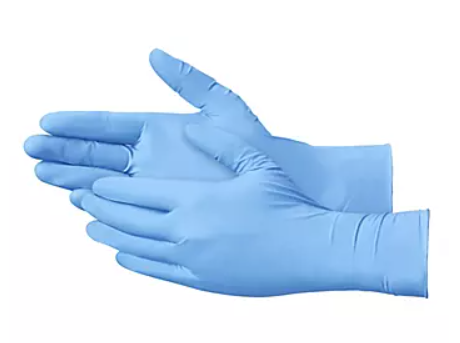In healthcare, where safety, hygiene, and protection are paramount, the choice of gloves plays a pivotal role. Among the various options available, nitrile gloves have emerged as a popular choice for healthcare professionals worldwide. They offer many benefits over traditional latex gloves, which have revolutionized hand protection in healthcare settings. The shift towards nitrile gloves reflects the industry’s commitment to giving the highest standard of care while addressing patients’ and professionals’ practical needs and safety concerns. Read on to explore the top benefits they bring to the table.

Superior Strength and Durability
One of these options’ foremost advantages is their exceptional strength and durability. Unlike latex handwear, which is prone to tears and punctures, these protective handwear are highly resistant to punctures, tears, and chemicals. This robustness ensures that professionals can confidently perform their tasks, knowing their hands are adequately protected from potential hazards. Their durability also means they can be used in more demanding tasks, offering consistent protection without the need for frequent changes.
Allergy-Free Composition
Latex allergies pose a significant concern in healthcare settings, affecting both patients and workers. These gloves offer a hypoallergenic alternative, free from latex proteins that can trigger allergic reactions. This allergy-free composition makes them suitable for individuals with latex sensitivities, ensuring a safe and comfortable experience for patients and providers. The adoption of nitrile gloves significantly reduces the instances of allergic reactions, promoting a healthier work environment.
Enhanced Chemical Resistance
Exposure to various chemicals and hazardous substances is inevitable in medical environments. These options boast superior chemical resistance compared to the latex ones, making them ideal for handling chemotherapy drugs, laboratory chemicals, and other potentially harmful substances. This enhanced chemical resistance minimizes the risk of permeation and ensures optimal protection against hazardous materials. Their ability to resist various chemicals ensures that healthcare professionals are adequately protected in diverse settings.
Excellent Puncture Resistance
Medical professionals frequently encounter sharp objects and instruments during their duties, increasing the risk of puncture injuries. These gloves offer excellent puncture resistance, providing additional protection against needle sticks, sharp edges, and other penetrating injuries. This feature is particularly crucial in operating rooms, emergency departments, and laboratories, where the risk of puncture accidents is higher. The superior puncture resistance also contributes to a safer working environment, minimizing the risk of exposure to bloodborne pathogens.
Comfort and Dexterity
Despite their robust nature, they do not compromise comfort and dexterity. These options conform to the shape of the hand, offering a snug and comfortable fit that allows for prolonged wear without causing discomfort or hand fatigue. Moreover, these options provide excellent tactile sensitivity and grip, enabling professionals to perform delicate tasks precisely and confidently. The balance between protection and user comfort makes them an ideal choice for tasks that require both safety and finesse.
Reduced Risk of Cross-Contamination
Mitigating the transmission of infections stands as a paramount concern within healthcare environments. These gloves help mitigate the risk of cross-contamination by providing a reliable barrier between workers and patients. Their superior barrier properties effectively block the transmission of microorganisms, bloodborne pathogens, and other infectious agents, reducing the likelihood of healthcare-associated infections (HAIs) and promoting patient safety. By serving as an effective barrier, they play a crucial role in infection control strategies.
Cost-Effectiveness
Although these gloves may initially entail a slightly higher investment than latex ones, their long-term economic viability merits attention. Due to their superior durability and puncture resistance, these options offer an extended shelf life and reduced risk of failure during use. In the long run, this translates to fewer changes, lower consumption, and cost savings for medical facilities. The financial benefits are significant, especially when considering the reduced incidence of glove-related complications.
Versatility and Adaptability
These options are renowned for their versatility and adaptability across various healthcare applications. Whether performing surgical procedures, conducting examinations, handling patient care tasks, or engaging in laboratory work, these are the go-to choices for professionals. Their ability to withstand various environmental conditions and tasks underscores their versatility, making them indispensable in diverse healthcare settings. The adaptability of nitrile gloves ensures that they meet the needs of various specialties within the healthcare sector.
Compliance with Regulatory Standards
Ensuring compliance with regulatory standards and guidelines is paramount in healthcare settings. These gloves meet stringent regulatory requirements set forth by organizations. By conforming to these standards, nitrile gloves offer reassurance to medical facilities, showcasing their dedication to upholding pinnacle levels of safety, excellence, and patient welfare. Their compliance with regulatory standards ensures safety and supports healthcare facilities in maintaining accreditation and meeting quality benchmarks.
Long Shelf Life and Storage Convenience
These options boast a long shelf life, making them ideal for stockpiling in healthcare facilities. Unlike some other types of gloves, these are less susceptible to degradation over time, ensuring their quality and integrity remain intact even when stored for extended periods. This extended shelf life reduces the frequency of glove replenishment and simplifies inventory management and storage logistics, contributing to operational efficiency in medical settings.
Conclusion
Nitrile gloves offer many benefits in healthcare settings, from superior strength and durability to allergy-free composition, enhanced chemical resistance, and reduced risk of cross-contamination. These protective handwear provide optimal protection for professionals and contribute to cost-effectiveness and environmental sustainability. By embracing these gloves, healthcare facilities can prioritize safety, hygiene, and efficiency, ultimately enhancing the quality of patient care.



